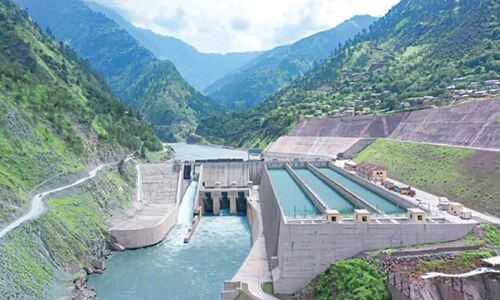ISLAMABAD: The non-performing loan (NPL) market in Pakistan is nascent compared with regional peers like India or China, and the secondary market is nearly non-existent, the International Finance Corporation (IFC) observed in a new report.
The IFC report, ‘Non-Performing Loan Market Assessment in Pakistan’ made available on Saturday says the stock of NPLs in Pakistan stood at Rs828 billion at the end of December 2020 (approximately $5bn) with 97pc provision coverage, and the infection ratio was about 9pc, including an average of 17pc for SME loans.
Further, about 10pc of the total outstanding gross advances as of March 2021 had been restructured or allowed a principal deferment under the State Bank debt relief scheme.
The report from the sister organisation of the World Bank presents the current state of Pakistan’s NPL market, identifying the legal, prudential, taxation, and other regulatory and practical impediments for financial institutions and potential NPL investors to create and operate a viable secondary market for NPLs.
Annual trends show a steady rise in commercial banking NPLs since 2017. In 2020, NPLs from the power, cement and agriculture segments were the top three contributors to NPL stock. Loans to the corporate sector comprise roughly 70pc of NPL stock in Pakistan.
The net NPLs of conventional banks reduced from Rs90.4bn in 2016 to Rs75.6bn in 2017 but increased to Rs110bn in 2018 and Rs141.3bn in 2019. In 2020, net NPLs decreased to Rs96.7bn, after loan deferral facilities were implemented by the State Bank of Pakistan (SBP), which has resulted in delayed NPL recognition.
The NPL to credit portfolio ratio shows that Sindh Bank Ltd, which ranks 6th in terms of NPL portfolio, has the highest infection ratio of 46pc in the banking industry. It also has the highest NPL to equity ratio of 185pc.
National Bank of Pakistan and Bank of Punjab have the second highest infection ratios, each with 15pc. NBP’s annual report shows this larger than usual increase was mainly on account of a general downturn in the economy in 2020 and effects on profitability caused by Covid-19 lockdowns.
Although the energy sector had the most advances, the sugar, electronics, textile, agribusiness, and automobile sectors had the highest rates of NPLs in 2020. During the second half of 2020, Covid-19 and locust plagues reduced Pakistan’s agricultural sector’s growth prospects and put millions of farmers in distress.
Over the past three years, the electronics sector’s infection ratio has risen from 15.7pc to 20.7pc, while the textile sector ratio has improved to 14.7pc from 22pc.
In 2020, the after-tax profits of the banking industry increased to 34pc compared with 21pc in 2019. This was partly on account of general economic relief measures taken by the government and the SBP in response to Covid-19. For the banking sector, these included, a 625 basis point cut in the policy rate, a temporary economic refinance facility (TERF), providing long-term concessionary refinancing at 5 percent for manufacturers and exporters, a Debt Relief Scheme offering principal deferment and restructuring of Rs911bn worth of loans, about 10pc of outstanding gross advances as of March 2021.
The net interest income of banks increased by 25pc, while non-mark-up income jumped by 16pc mainly due to strong capital gains in treasuries, marking an annual increase of roughly 11 times. Compared with strong growth in bottom lines in 2020, the growth of loans and advances was lacklustre at only 2pc.
In the first quarter of 2021, NPLs increased by Rs22bn to Rs850bn. Based on the financial results for the nine months ending Sept 30, 2021, there has been a better-than-expected recovery of loans, evidenced by some of the banks contributing large gross advances booking 75pc higher provision reversals in this period when compared with the same period last year.
The report says there are shortcomings in the existing taxation framework which can create tax disincentives in NPL transactions for investors and banks by increasing the price gap between NPL buyers and sellers. The increase in the price gap may be caused by the taxation framework which delays and limits provisioning expense benefits or write-offs available to NPL buyers and sellers.
There have been few securitisation transactions in Pakistan even though the legal framework for securitisation has been in place for almost two decades. Developing a secondary market through securitisation has not received traction recently.
The legal framework for securitisation enables a secondary market, however, it is impeded by, underlying issues relating to the NPLs quality, recovery, tax allowance of provisions or losses in an NPL sale transaction.
The chronic issues in Pakistan’s recovery system including court and litigation processes are the primary impediments to NPL resolution. Recovery laws in Pakistan are evolving and despite a series of laws enacted to address delays and offer fast track recovery avenues to banks and DFIs, disposal of recovery cases remains a time-consuming process.
As part of ensuring compliance with Financial Action Task Force (FATF) requirements, trust laws have recently been overhauled which means syndicated security arrangements under trust structures, which are common in Pakistan, must be registered annually with the relevant government agency.
Published in Dawn, August 14th, 2022














































Dear visitor, the comments section is undergoing an overhaul and will return soon.